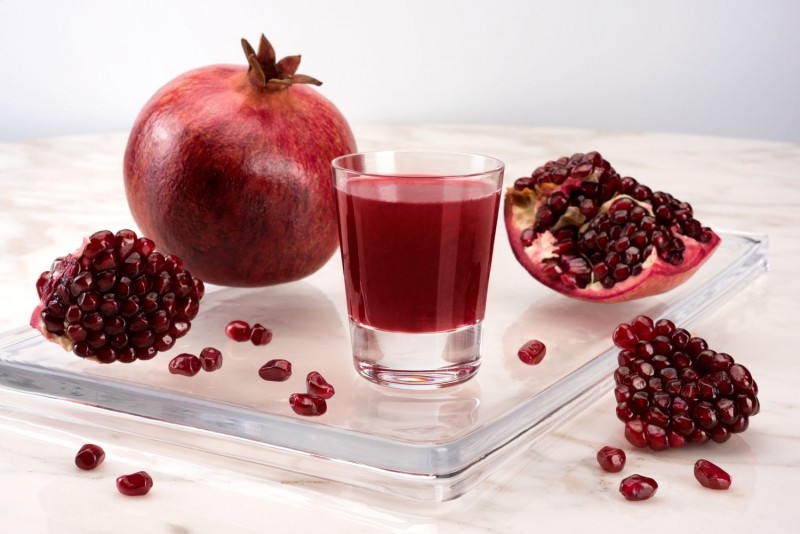
Winter is synonymous with warm blankets, cozy evenings, and a desire for nourishing beverages. While pomegranate juice boasts numerous health benefits, it's crucial to be aware of potential drawbacks, especially during the colder months. Let's explore the flip side of sipping on this ruby-red elixir.
Pomegranate juice is naturally sweet, but excessive consumption can lead to a surge in sugar intake. This can be particularly problematic for individuals monitoring their sugar levels, potentially contributing to weight gain and other health issues.
Though pomegranate juice is rich in antioxidants, it comes with a caloric load. Regular consumption without considering its caloric content may lead to unintended weight gain, a common concern during the winter months when outdoor activities might decrease.
Some individuals may experience allergic reactions to pomegranate or its seeds. Winter, with its unique set of allergens, might exacerbate these reactions, leading to discomfort and health complications.
Pomegranate juice has been found to interact with certain medications. Winter is often flu season, and individuals on medication should exercise caution, as the juice might interfere with the effectiveness of drugs.
For those with sensitive stomachs, the acidity of pomegranate juice might pose a challenge. In winter, when digestive issues tend to flare up, it's wise to moderate consumption to avoid discomfort.
Pomegranate juice is often served chilled, which might not be the best choice during the winter months. Cold beverages can exacerbate cold sensitivity, making individuals more susceptible to the winter chill.
The vibrant color of pomegranate juice comes from pigments that can stain teeth. In winter, when maintaining oral health is crucial, this staining potential adds an extra layer of concern.
Winter is a season where many expenses peak, and pomegranates are no exception. The cost of fresh pomegranates can rise during winter, impacting budget-conscious consumers.
Considering the environmental impact of consuming out-of-season fruits is vital. Pomegranates may be sourced from distant locations in winter, contributing to carbon footprints and environmental concerns.
Storing fresh pomegranates or juice can be challenging in winter when refrigerators are often stocked with a variety of seasonal produce. Proper storage is essential to maintain the juice's quality.
While pomegranate juice is hydrating, it should not replace the consumption of plain water. In winter, staying adequately hydrated is essential, and relying solely on flavored juices may disrupt this balance.
Pomegranate juice is celebrated for its heart-healthy properties, but excessive intake may lead to an unintended increase in blood pressure. Individuals with heart conditions should consume it in moderation.
For those managing diabetes, monitoring blood sugar levels is crucial. Pomegranate juice, despite its benefits, may cause spikes, requiring careful consideration during the winter months.
Winter invites hearty, complex dishes. Pomegranate juice, when used in intricate recipes, might lose its distinct flavor, blending into the overall dish without standing out.
Fresh pomegranates may not be as readily available in winter compared to other seasons. This limited availability may affect accessibility for those keen on preparing their juice.
Whole pomegranates contain fiber, but the juice lacks this essential component. In winter, when a feeling of fullness is crucial, the absence of fiber might pose a challenge for those seeking satiety.
Pomegranate juice is sensitive to temperature changes. Freezing temperatures in winter might compromise its quality during storage or transportation, affecting the overall taste.
Cultural differences play a role in how pomegranate juice is perceived. In some cultures, it might be an integral part of winter traditions, while in others, it might be an acquired taste.
Many are unaware of the potential downsides of pomegranate juice. Winter provides an opportunity to educate individuals about making informed choices and understanding the beverage's impact on health.
The commercial production of pomegranate juice may not always align with sustainable practices. Winter, a season of environmental consciousness, prompts us to reflect on the ecological impact of our beverage choices. In conclusion, while pomegranate juice offers a burst of flavor and health benefits, it's essential to approach its consumption in winter with a discerning eye. Moderation, awareness of individual health conditions, and consideration of the environmental impact are key aspects of enjoying this ruby-red elixir responsibly.
Hair falling rapidly? Are you seriously ill? Understand your body's signals
Car Battery Care Tips: If you are also making this mistake, your car will make you sweat!
Inauspicious Meanings of Seeing a Cow in a Dream in These 5 Ways